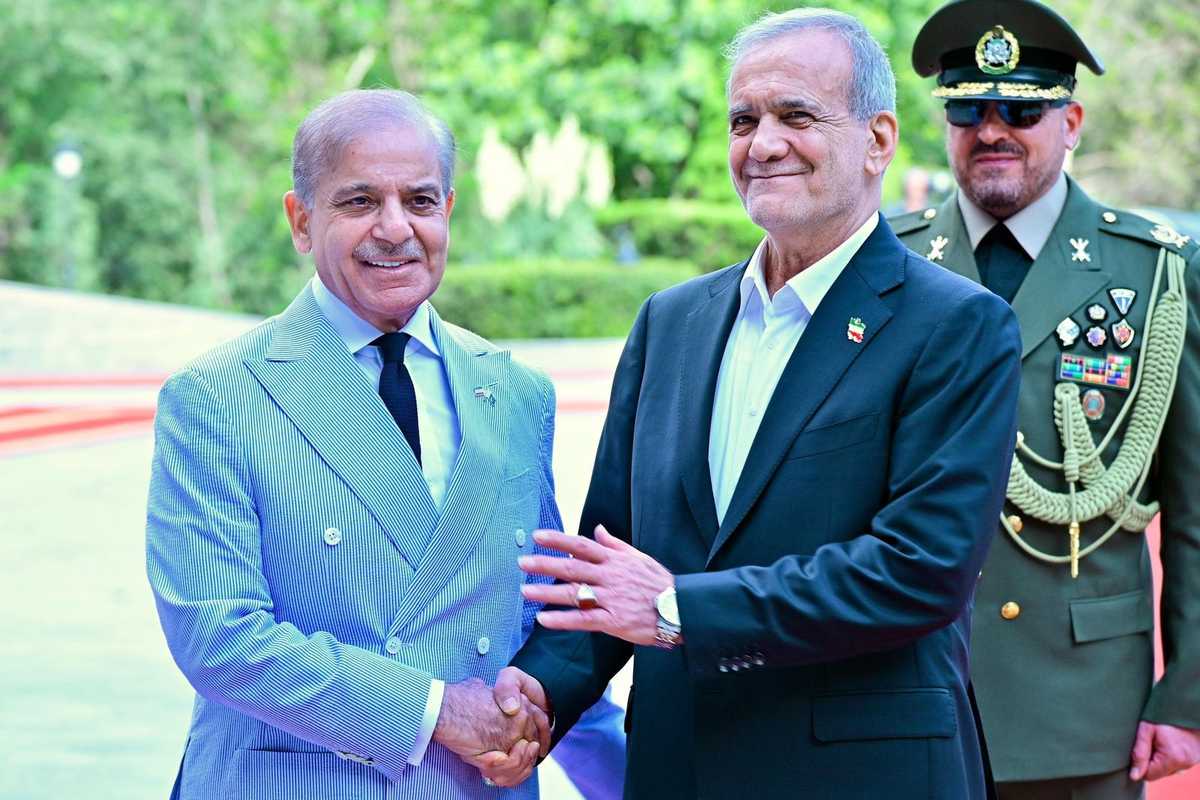News Desk
The News Desk provides timely and factual coverage of national and international events, with an emphasis on accuracy and clarity.

Prime Minister Shehbaz Sharif is seen along with Iranian President Masoud Pezeshkian.
@pmln_org/X
While recognizing Iran’s right to self-defense under Article 51 of the U.N. Charter, Pakistan’s Prime Minister Shehbaz Sharif on Sunday urged a swift return to dialogue and diplomacy as the only way to prevent further escalation following U.S. airstrikes on Iranian nuclear sites.
He also called for urgent, collective international efforts to de-escalate the crisis and reiterated Pakistan’s readiness to play a constructive role.
Shehbaz made these remarks during a phone call with Iranian President Masoud Pezeshkian, according to a statement issued by the Prime Minister’s Office. The call came hours after U.S. President Donald Trump announced that American forces had struck Iran’s nuclear facilities in Natanz, Isfahan and Fordow — marking a dramatic expansion of Israel’s military campaign against Iran.
In his conversation with Pezeshkian, the Pakistani leader strongly condemned the U.S. strikes, saying they followed Israel’s “unprovoked and unjustified aggression” over the past eight days.
Shehbaz expressed “unwavering solidarity” with the people and government of Iran and extended condolences for those killed. He also prayed for the swift recovery of the wounded.
The prime minister said the U.S. attacks had targeted facilities under the supervision of the International Atomic Energy Agency (IAEA), calling it a “serious violation” of international law and the IAEA Statute.
Pezeshkian thanked the Pakistani government, people and military for standing with Iran and conveyed deep appreciation for the solidarity shown at what he described as a critical time.
Both leaders agreed to stay in close contact and emphasized the urgency of Muslim unity in response to the widening conflict.
The call came shortly after Trump described the strikes as a “spectacular military success” during a televised address.
“If peace does not come quickly, we will go after those other targets with precision, speed and skill,” Trump warned. The White House said B-2 bombers and Tomahawk missiles were used in the operation, with six bunker-buster bombs striking the Fordow site.
U.S. officials told CBS News that Washington had conveyed through diplomatic channels that no further strikes are planned and that the U.S. does not seek regime change in Iran.
The strikes followed more than a week of deadly aerial exchanges between Israel and Iran. Iran’s health ministry said more than 430 people have been killed and over 3,500 injured in Israeli attacks. Israeli authorities reported 24 civilian deaths and more than 1,200 injuries.
Israel began its military campaign on June 13, accusing Tehran of advancing its nuclear weapons program — an allegation Iran denies. Iran says its nuclear activities are strictly for peaceful purposes.
In Washington, Trump’s move drew mixed reactions. Some Republicans backed the decision, but others — including many Democrats — criticized the president for acting without congressional approval.
“This is not constitutional,” said Rep. Thomas Massie, R-Ky. Rep. Alexandria Ocasio-Cortez, D-N.Y., said the strike was “absolutely and clearly grounds for impeachment.”
The conflict has disrupted regional energy supplies, triggered attacks on infrastructure, and raised fears about global oil prices and economic fallout due to growing threats to shipping in the Strait of Hormuz.
U.S. Defense Secretary Pete Hegseth is expected to address the public later Sunday.
UN Secretary-General Antonio Guterres described the U.S. strikes as “a dangerous escalation in a region already on the edge.”
Pakistan, along with several other nations, has urged restraint and a return to diplomacy. “The only viable pathway to resolve the crises in the region,” Shehbaz’s office said, “is through diplomacy."







Comments
See what people are discussing